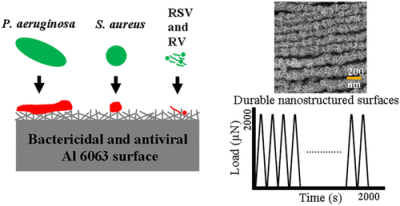
Etching process turns aluminum sheets into antiviral, antibacterial surfaces
By DE Staff
General MedicalResearch by Queensland University of Technology engineers looks to reduce spread of COVID-19 and other infections in hospitals.

(Photo credit: Institute for Future Environments, Queensland University of Technology, Brisbane)
And although some surfaces have been developed that can combat bacteria alone, the coronavirus pandemic has sparked demand for a material and/or surface treatment that is also antiviral.
According to a report in ACS Biomaterials Science & Engineering, researchers at Queensland University of Technology, Brisbane have developed a process that makes the aluminum alloy used in healthcare equipment inherently antiviral and antibacterial.
To develop their technique, the QUT researches turned to nature, specifically the microscopic structural features on insect wings that distort and kill pathogen cells. The research team replicated this effect by etching aluminum 6063, an alloy commonly used in medical equipment, with sodium hydroxide for up to three hours. The wet etching technique created randomly-aligned ridges, approximately 23nm wide, that changed the alloy’s smooth, hydrophobic surface into a ridged, hydrophilic surface.
The result, the report states, was the inactivation of most of the Gram negative bacteria Pseudomonas aeruginosa and the Gram positive bacteria Staphylococcus aureus after three hours on the surface. More importantly, the viability of common respiratory viruses, like respiratory syncytial virus (RSV) and rhinovirus (RV), dropped within two hours. Both results were better than with plastic or smooth aluminum surfaces.
Despite the etching process, the researchers said the disks retained their effectiveness even after tests designed to mimic hospital wear and tear. The researchers say their work is the first to show combined antibacterial and antiviral properties of a durable, nanostructured surface. The discovery could stop the spread of infections transmitted via physical surfaces, whether in hospitals or other public areas, such as cruise ships, planes and airports, they said. The team is now studying the effects of their nano-textured aluminum surfaces on the novel coronavirus.
www.qut.edu.au
